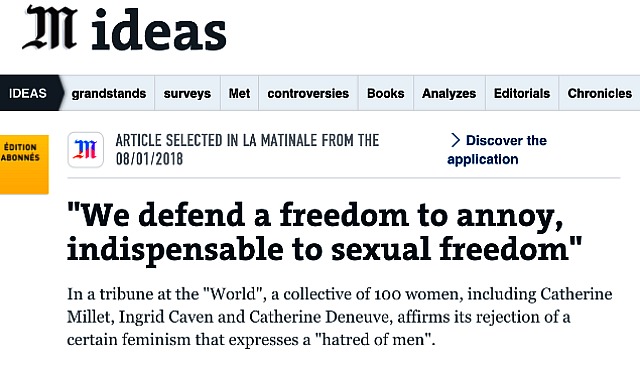A libertarian-minded #MeToo pushback essay appeared in today’s (1.8.18) Le Monde, and the headline is a grabber — “We defend a freedom to annoy, [which is] indispensable to sexual freedom.”
Written by clinical psychologist and psychoanalyst Sarah Chiche and supported by more than 100 “prominent” French women including Catherine Denueve and Catherine Robbe-Grillet, it basically says that the #MeToo movement is attacking sexual freedom and “binding women to a status of eternal victims”, and is becoming more or less Stalinist (my term, not theirs), and has thereby overstepped and made social and cyber life feel oppressive in some respects.
Here is the essence of the essay: “The philosopher Ruwen Ogien defended a freedom to offend essential to artistic creation. In the same way, we defend a freedom to annoy, indispensable to sexual freedom. We are now sufficiently warned to admit that the sexual drive is by nature offensive and savage, but we are also sufficiently clairvoyant not to confuse clumsy [attempts at flirtation with] sexual assault.”

Here’s the article [robo-tranlation is included], and here are some choice excerpts:
(1) “In fact, #metoo has led in the press and on social networks a campaign of public denunciations and impeachment of individuals who, without being given the opportunity to respond or defend themselves, were put exactly on the same level as sex offenders. This expeditious justice already has its victims, men sanctioned in the exercise of their profession, forced to resign, etc., while they were only wrong to have touched one knee, tried to steal a kissing, talking about ‘intimate’ things at a business dinner, or sending sexually explicit messages to a woman who was not attracted to [them].
(2) “This fever to send ‘pigs’ to slaughter, far from helping women to empower themselves, actually serves the interests of the enemies of sexual freedom, religious extremists, the worst reactionaries and those who believe [in] Victorian morality that goes with it, that women are beings ‘apart’, children with an adult face, demanding to be protected.
(3) “[Meanwhile] men are summoned to beat their guilt and to find, in the depths of their retrospective consciousness, a ‘misplaced behavior’ that they could have had 10, 20 or 30 years ago, and of which they should repent. Public confession, the incursion of self-proclaimed prosecutors in the private sphere, [is part of] the climate of a totalitarian society.
(4) The purificatory wave seems to know no limit. There, we censor a nude of Egon Schiele on a poster; here we call for the removal of a Balthus painting from a museum on the grounds that it would be an apology for pedophilia; in the confusion of the man and the work, we ask the ban of the Roman Polanski retrospective at the Cinémathèque and we obtain the postponement of that devoted to Jean-Claude Brisseau. An academic finds Michelangelo Antonioni‘s film Blow-Up ‘misogynistic’ and ‘unacceptable’. In the light of this revisionism, John Ford and even Nicolas Poussin [are under suspicion].
(5) [Repeating] “The philosopher Ruwen Ogien defended a freedom to offend essential to artistic creation. In the same way, we defend a freedom to annoy, indispensable to sexual freedom. We are now sufficiently warned to admit that the sexual drive is by nature offensive and savage, but we are also sufficiently clairvoyant not to confuse clumsy drag and sexual assault.
(6) “Above all, we are aware that human [beings are] not monolithic: a woman can, in the same day, lead a professional team and enjoy being the sexual object of a man, without being a ‘slut’ or a vile accomplice of patriarchy. She can ensure that her salary is equal to that of a man, but not feel traumatized forever by a rub on the subway, even if it is considered a crime. She can even consider it as the expression of great sexual misery, or even as a non-event.
(7) “As women, we do not recognize ourselves in this feminism which, beyond the denunciation of abuses of power, takes the face of a hatred of men and sexuality. We believe that the freedom to say no to a sexual proposal is not without the freedom to bother. And we consider that we must know how to respond to this freedom to annoy other than by shutting ourselves up in the role of the prey.”












